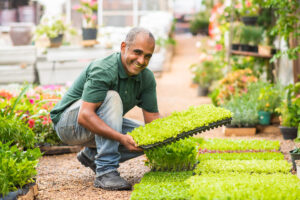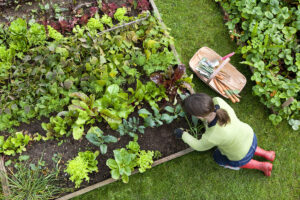The winter months are ideal for planning a summer vegetable garden. That process entails everything from plotting and building raised beds, amending soil, deciding which crops to grow, and determining the best layout to optimize sun/shade exposure and the plants’ irrigation needs.
If there’s one piece of advice any garden supply in New Jersey would give to new vegetable gardeners it is this: start small and (literally) grow from there.
Start Small Using a Garden Supply in New Jersey
 Shopping for vegetable seeds and starts can become intoxicating, leading beginning gardener’s to go big – and quickly become overwhelmed. More veggies means more to learn, more to build and prepare, and more to maintain – including tending to weeds and pests.
Shopping for vegetable seeds and starts can become intoxicating, leading beginning gardener’s to go big – and quickly become overwhelmed. More veggies means more to learn, more to build and prepare, and more to maintain – including tending to weeds and pests.
Mendham Garden Center, a garden supply in New Jersey, has everything you need to plan summer vegetable gardens. Plus, each of our family-owned and locally-operated locations employs friendly, helpful, and enthusiastic garden pros that are eager and willing to help you plan your garden for success.
Our first piece of advice, as mentioned above, is to start small. Ways to do this include:
- Reviewing lists of easy-to-grow veggies for beginners and then narrowing that list to your family’s five or six favorites
- Thinking about what vegetables your family consumes most and prioritizing those
- Using the professionals at your garden supply in New Jersey to learn which plants yield the most veggies and planting less of those
For example, zucchini and crookneck squash are notoriously prolific, so only one of each of those plants is usually enough for any family at on their own. On the flip side, you may want anywhere from six- to 12 green bean plants to ensure their harvest provides multiple, dinner-worthy portions throughout the summer and fall.
Consider raised beds
 There are several advantages to growing in raised beds, and pest protection is one of the greatest of them. Gophers, voles, and moles are notoriously destructive to garden bed, “attacking” from underground. By plotting vegetable beds aboveground, and filling them with nutrient rich soil and fertilizers, you can install special wire below the beds’ soil to keep rodents out while ensuring worms and other beneficial bio-organisms have access to the soil.
There are several advantages to growing in raised beds, and pest protection is one of the greatest of them. Gophers, voles, and moles are notoriously destructive to garden bed, “attacking” from underground. By plotting vegetable beds aboveground, and filling them with nutrient rich soil and fertilizers, you can install special wire below the beds’ soil to keep rodents out while ensuring worms and other beneficial bio-organisms have access to the soil.
Also, raised beds are more likely to remain weed-free and are easier to weed when any take up residence. We can help you learn how to best plant your garden to repel insects and other pests.
Sun, shade, and moisture exposure
Watch prospective garden areas throughout the day and take note of sun/shade exposure during each hour. Bring this information with you to your garden supply in New Jersey. Using those notes, we can help you determine what to grow where in regards to plants’ needs.
For example, tomatoes are sun worshippers and need direct sun exposure for at least six- to eight hours a day for optimal flavor and yield. This may require trimming some branches or prioritizing certain bed locations to give veggies what they need. Lettuces, kale, and chard, on the other hand, thrive in shadier areas of the yard. Comparing well-draining vs poorly-draining areas helps to form irrigation plans.
Roamers, climbers, and bushers
Spacing plants and planning ideal structures also depends on whether they’re roamers (like most squashes) or climbers (like pole beans or peas). Some plants, like cherry tomatoes, are aggressive roamers and climbers, and they can choke out other plants if not well-placed.
 Ready to get started planning your vegetable garden? Benefit from Mendham Garden supply in New Jersey’s expertise at one of our three convenient locations: Mendham, Chester, and Annandale.
Ready to get started planning your vegetable garden? Benefit from Mendham Garden supply in New Jersey’s expertise at one of our three convenient locations: Mendham, Chester, and Annandale.

